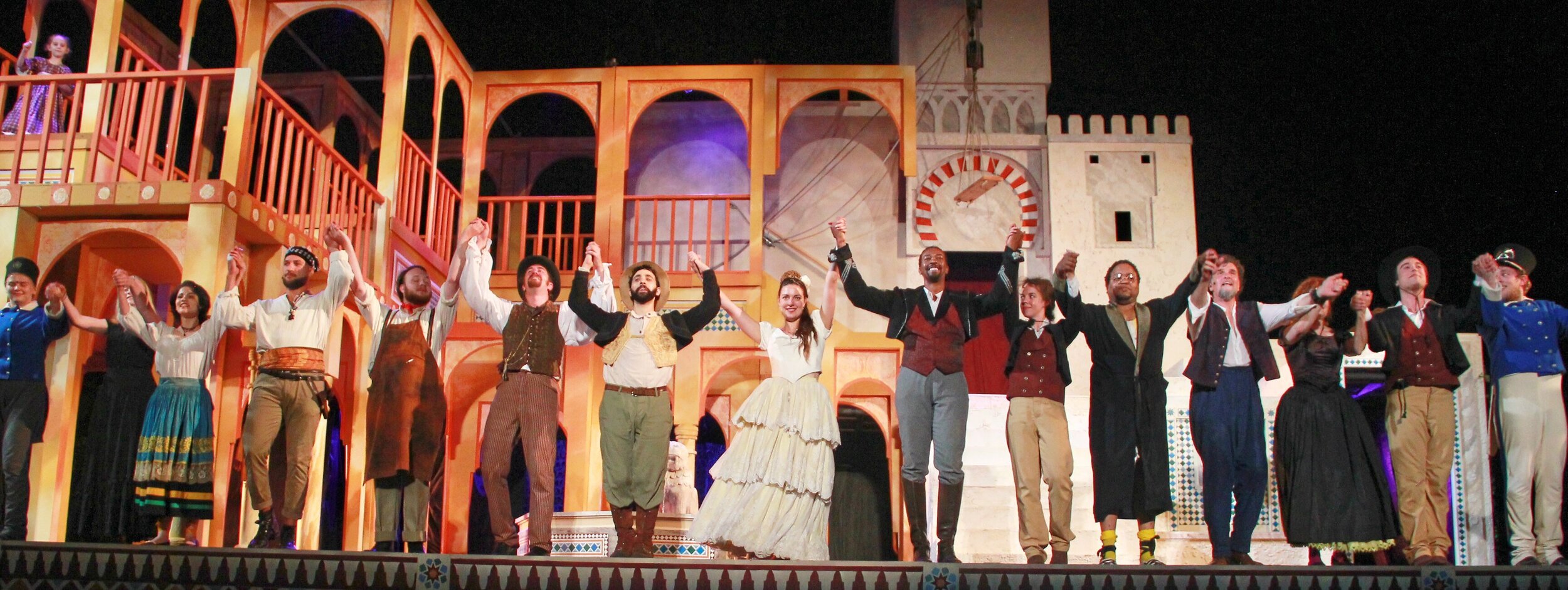“To be, or not to be. That is the question.”
”If you prick us, do we not bleed?”
”What’s in a name? A rose by any other name would smell as sweet.”
”With mirth and laughter let old wrinkles come.”
So much of Shakespeare’s poetry speaks to what it means to be human. And though written within a specific historical context, the language also holds an ambiguity that allows larger truths to be spoken. These larger expressions of humanity speak to our most basic humanity on a deep level, beyond time period, beyond gender, beyond cultural identity. It is one reason why these plays have lasted and are so beloved. We believe in the power of these words in our world today and that they empower both those who hear and speak them.
However… There is another side of Shakespeare…
A woman’s need to be tamed…and a man’s right to do so,
Religious conversion as appropriate punishment,
Caricatured representations of those considered ‘outsiders’
Images of Blackness as evil
Shakespeare’s plays can also contain characterizations, plots and imagery that are troubling and even unacceptable in today’s theater. They were created within a particular world view that no longer exists, and while their historical context should be understood, their place on the American stage in 2024 and beyond is rightly questioned as are other unfair practices within the theatre world.
Yet, Elm Shakespeare still believes in the transcendent power of these plays. We believe in the tradition of coming together and experiencing what we share as humans illuminated by these plays. When we come together, there is an incredible multiplicity of identities: young and old, rich and poor, red and blue, devout and atheist, gay and straight, Black, White, Latinx, Asian, Middle Eastern, and so many more. We are a complex community – with contradicting perspectives and attributes, just like the plays. And, we believe that if authentically and specifically represented, all of these people – all of these humans – can see themselves and their stories within the plays.
And more importantly, they can see and hear each other. These plays, with all their complexity – their beauty, ugliness, love, and evil – can, if brought to life with intentionality, deep collaboration and respect, show us our own complexity in ways that reveal we have more in common than we think. An audience and cast share an embodied emotional experience which fosters and magnifies empathy, which in turn has the power to heal. Only by sharing all of it, the good and the bad, can healing occur.
Elm Shakespeare believes in that power, the power of sharing our complex humanity through passionate, inclusive, artistically excellent, and intelligent productions of equally complex plays.
It all depends on how these productions are created and presented.
How Elm Does Shakespeare
The lofty goal of bringing people together to have a shared (and hopefully healing) experience of their humanity through these plays can be reached only if productions are created with intentional practice that addresses both the plays’ and our community’s complexity. What follows are the beliefs intentional practices Elm Shakespeare uses in its work.
These plays are for today. If they do not serve the audiences of 2024, they have no value. We are not interested in historic preservation or tradition, except as they are useful to finding deeper understanding of the plays and our expression of them. That said – great beauty, joy, and resonance can sometimes be found in historical design choices and context.
Our performances are for everyone. For theater to speak to everyone in our community, their voices and experience must be authentically represented. As such, the people making the performances (on and off stage) must represent our full community. Because our audiences are so broad in their make-up, until we can offer a multiplicity of performances, no one social identity will likely take priority in an entire production.
We are committed to Culturally-Specific & Conscious Casting. We believe that the representation of our community on stage should be made with culturally conscious and conscientious storytelling in mind. We do not believe in the possibility or desirability of colorblind casting.
Theatre making is collaborative and all voices should contribute. We want our artists’ FULL selves in the rehearsal room and on stage. We invite and expect our artists to contribute their full experience of this language and the play to the collaborative process, as well as the complex conversations this may create. We do not believe that any one person has the “correct” interpretation, and while the artistic process is not democratic, no experience is invalid in the rehearsal room. We are committed to making the artistic work space and process welcoming and fulfilling to everyone involved.
These plays require skilled artists to be done well. The heightened language and structure of these plays are demanding and to bring them to life most effectively requires specific skills, usually found through advanced and specialized training. We are committed to helping young artists, especially those without other access to it, get this training.
They are PLAYS not WORKS. We value rigorous curiosity and balance our sense of purpose with joy, humor, and wit, while continually questioning our own assumptions about how Shakespeare’s plays ‘should’ be done. We don’t want to take our art or ourselves too seriously.
Live Performance matters. We believe in the power of the actor/audience relationship in real time and space, and look to explore that in all of our work, whenever possible.


